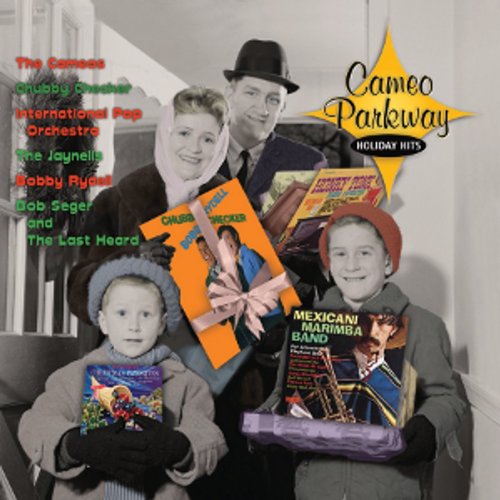CAMEO PARKWAY HOLIDAY HITS
Various Artists
Real Gone MusicCameo Parkway Holiday Hits, comprised of 16 tracks issued by the legendary Philadelphia label between 1957 and 1967, isn’t even close to being as much fun or as meaningful as, say, Atlantic’s original Soul Christmas album (reviewed elsewhere in this issue), but it has a certain kitschy charm.
As a music enterprise, Cameo Parkway seemed willing to try pretty much anything in an effort to sell records. Some good came out of that approach: Charlie Gracie’s “Butterfly” (the label’s first #1 hit, in 1957); the Rays’ “Silhouettes”; the Dovells’ “Bristol Stomp (1961); a string of superb singles by the Orlons; Dee Dee Sharp’s “Mashed Potato Time” (1962); and one of the all-time great pop-R&B love ballads, The Tymes’ classic “So Much In Love” (#1, 1963). Bobby Rydell, one of the biggest of all Cameo Parkway stars, was no kind of rock ‘n’ roller but he could swing and had a nice way with pop songs, especially the slower ones--his “Forget Him,” an earnest, atmospheric come-on to a girl wasting her time on a boy who doesn’t love her, is an honest, affecting performance, and “The Cha-Cha-Cha,” with its cheesy roller-rink organ, girl group background chorus, and a storyline extolling the aphrodisiacal virtues of a certain dance, is a catchy single. Then of course there was the hapless Chubby Checker, whom my older brother once dismissed as “completely useless,” no matter his string of dance hits (yet another reason to be grateful for the British Invasion running marginal talents like Chubby off the charts for good) and about whom the less said the better.
The Jaynells, ‘I’ll Stay Home’ (1963), piano by Curtis Mayfield. From Cameo Parkway Holiday Hits.Despite all the abovementioned great singles, the label’s holiday recordings had none of the inspirational grandeur of, say, Atlantic’s Soul Christmas. The “Holiday Hits” collected here do, however, represent a lot of what Cameo Parkway was about in its broad-based pursuit of hits: as Gene Sculatti observes in his liner notes, “The label’s pop-rock side is amply displayed, but so are such disparate wings of the music library as bluegrass, doo-wop, comedy, orchestral, big-band and Latin marimba sounds.” Of these, by far the best are three doo-wop tracks: two jumping celebrations by the Cameos (one a plaintive love song awash in tolling bells--a la the Del-Vikings' "Whispering Bells"--“Merry Christmas,” from 1957; the other, also from ’57, “New Years Eve,” equally rhythm-bound but with a scintillating swirl of bass acrobatics and suave crooning supporting the gentle lead vocal of James Oscar “Cisco” Williams); and the third, a sweet, romantic love ballad by the Jaynells from 1963, “I’ll Stay Home (New Year’s Eve)” in the style of (as Sculatti points out in his notes) Shep & the Limelites and featuring tinkly background piano punctuations by none other than Curtis Mayfield. On the rockin’ side a young Bob Seger and the Last Heard absolutely scorch “Sock It To Me Santa,” a blistering soul rocker from 1966 done in shameless imitation of Mitch Ryder & the Detroit Wheels.
Bob Seger & the Last Heard, ‘Sock It To Me Santa’ (1966), from Cameo Parkway Holiday HitsOtherwise the disc is fleshed out with unremarkable but pleasant instrumental fare by the International Pop Orchestra; the Rudolph Statler Orchestra doing its best to craft Lawrence Welk-style champagne music with its bubbly trio of standards; the Mexican Marimba Band adding the slightest of Latin flavor to an instrumental “Twelve Days of Christmas”; some strained comedy by Bobby the Poet (someone imitating both Robert F. Kennedy and the ‘60s Bob Dylan, who sings “White Christmas” while being interrupted by a weather man giving the temperatures in various cities, in a parody of a parody, with the song modeled after Simon and Garfunkel’s “7 O’Clock News/Silent Night,” which featured a newscaster broadcasting reports from the Vietnam War while the song was being sung); Bob Johnson and the Lonesome Travelers cook up a hard charging bluegrass version of “Auld Lang Syne” fueled by Johnson’s rolling and tumbling banjo and impeccable, fleet-fingered mandolin soloing by none other than Norman Blake, as Roy Huskey Jr. keeps the bottom solid with his thumping standup bass. And, yes, Chubby shows up, twice in fact, both times with his buddy Bobby Rydell. Truth be told, on an engaging rendition of “Jingle Bell Rock” Chubby does fine playing it straight. “Jingle Bell Imitations,” on the other hand, is a full-on Chubby travesty as he tries to impersonate the vocal styles of Elvis and Fats Domino singing “Jingle Bells”; Rydell is more credible doing Bobby Darin, and even better in an on-the-money imitation of Crazy Guggenheim, the tipsy crooner played by Frank Fontaine in the “Joe the Bartender” skits on The Jackie Gleason Show. Comme ci, comme ça. Holiday Hits is Cameo Parkway in microcosm. --David McGee
Cameo Parkway Holiday Hits is available at www.amazon.com
Founder/Publisher/Editor: David McGee
Contributing Editors: Billy Altman, Laura Fissinger, Christopher Hill, Derk Richardson
Logo Design: John Mendelsohn (www.johnmendelsohn.com)
Website Design: Kieran McGee (www.kieranmcgee.com)
Staff Photographers: Audrey Harrod (Louisville, KY; www.flickr.com/audreyharrod), Alicia Zappier (New York)
E-mail: thebluegrassspecial@gmail.com
Mailing Address: David McGee, 201 W. 85 St.—5B, New York, NY 10024



